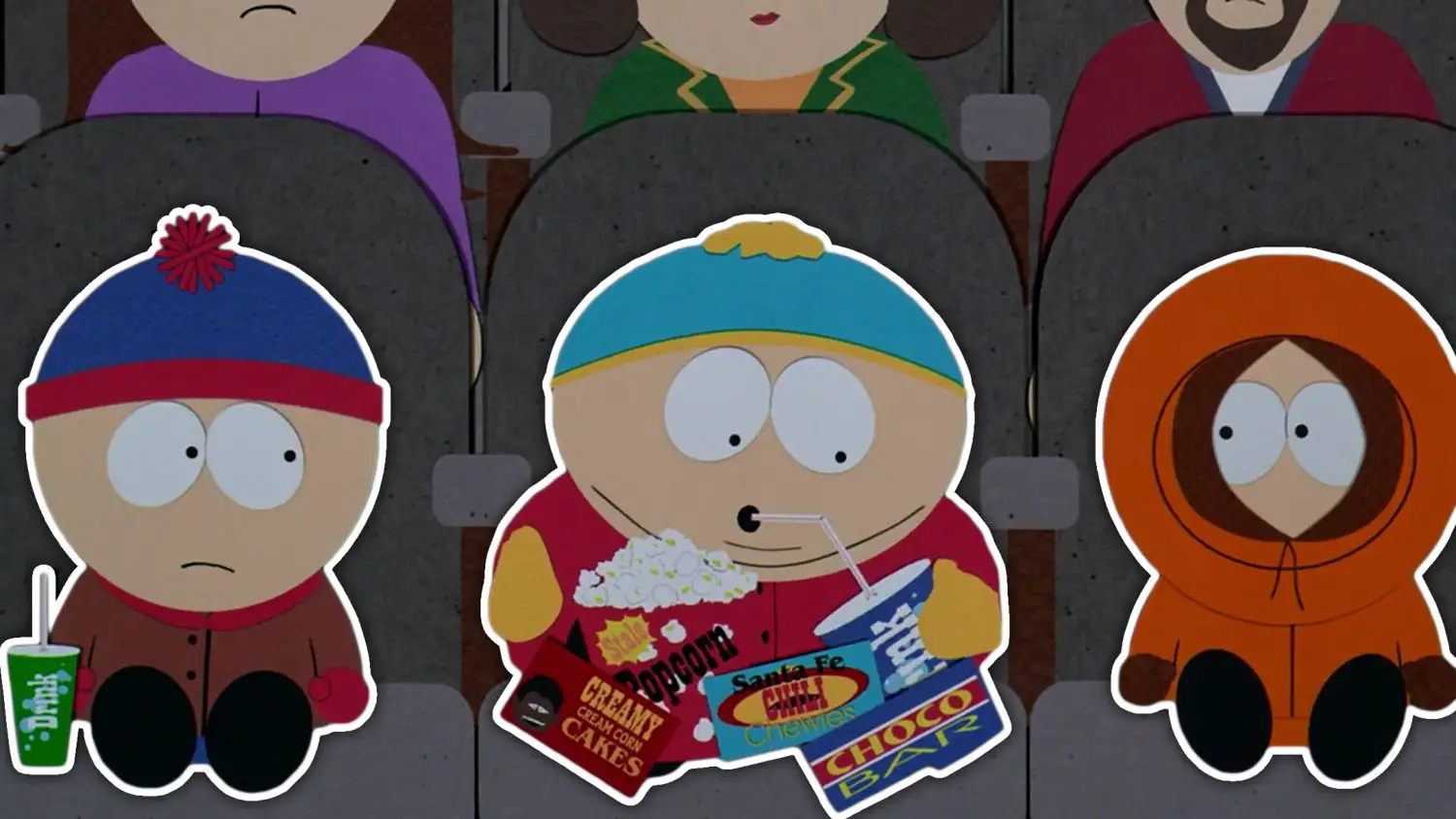Let’s look at the context of where South Park was when South Park: Bigger, Longer & Uncut, the franchise’s first and only theatrical movie, came out on June 30, 1999, 20 years ago this past weekend.
South Park burst on the scene in the summer and fall of 1997, when its first season aired on Comedy Central; a then crudely-animated story about four vulgar children who said and did things unlike any characters on TV before that. I remember word about the show slowly trickling via email that summer among my group of college friends, who when school started were putting the “Spirit of Christmas” short on each other’s bulky desktop computers.
Barely a year after the show’s debut, there was already word of a big-screen movie, and a few months before the release, there was a trailer, which like just about every action movie preview in the latter half of the ’90s, used the music from Carl Orff’s “O Fortuna”, from Carmina Burana.
…the franchise’s first and only theatrical movie, came out on June 30, 1999, 20 years ago this past weekend.
The movie came out in the summer of 1999, less than two years after the show’s debut, and the key factor in its success was that it wasn’t simply an overlong episode of the TV show. Instead, it was considerably more ambitious than the show had been up to that point – complete with a full suite of musical numbers. Really, really good ones, too!
Four tickets to Terrence and Phillip’s “Asses of Fire” Please
Bigger, Longer, & Uncut centers on the release of a new movie, Asses of Fire, starring Terrence and Phillip, the boys’ fart-based Canadian comedy heroes, and a stand-in for what South Park’s creators saw in the show.
When Stan, Kyle, Kenny and Cartman sneak into the R-rated Asses of Fire and begin cursing up a storm as a result, Kyle’s mom deflects the blame towards Canada, leading to a threat to execute Terrence and Philip, as well as an actual shooting war with our neighbors to the north, in a plot point borrowed from Michael Moore’s early-’90s movie Canadian Bacon.
There’s also a subplot about Stan’s quest to “find the clitoris”- a joke with an outstanding payoff- and another involving Satan, in hell, trapped in an abusive gay affair with Saddam Hussein. (The film was made between the Iraq Wars and in it, Saddam Hussein has two different deaths, both of which turned out much better for the world than the way Saddam actually died, a few years later).
“When did this song become a marathon?”
The film, 20 years on, is still screamingly funny, and the best thing of all are the songs, which creators Trey Parker and Matt Stone wrote along with Broadway veteran Mark Shaiman. The songs are a combination of homage to the Disney and Broadway musical canons, and funny bits based on established catchphrases (“I’m Super,” “What Would Brian Boitano Do?”) from the TV show. One, “Blame Canada,” was even nominated for an Academy Award. Robin Williams would sing “Blame Canada” on the Oscars, despite having nothing to do with the movie.
The songs are a combination of homage to the Disney and Broadway musical canons, and funny bits based on established catchphrases…
Then there was “Uncle Fukka,” the vulgar “Oklahoma!” homage from the Terrence and Philip movie-within-a-movie. I was a camp counselor that summer, and spent a whole week between sessions fearing that the next group of kids to arrive would have seen the movie and would be reciting “Uncle Fukka” nonstop once they arrived. Which, come to think of it, put me in the Mrs. Brozlovsky role, although I’ve always been opposed to war with Canada.
Today, somewhat remarkably, I have kids who are the age of the South Park kids, yet all these years later, they stay the same age.
The Politics of Cartman
Throughout its run, South Park’s politics have always been idiosyncratic, often incoherent, and at times somewhat indefensible (remember ManBearPig?) At its worst, the show embraces a smug libertarianism in which the most mockable people of all are those who care about things.
A Reddit user summed up the critique of the show’s ideology:
Like most established comedy institutions, the show has had no comedic answer to speak of for the Trump Era. And though it’s no fault of Parker and Stone, it’s been argued convincingly that Eric Cartman, with his boorishness, vulgarity, and casual sexism and anti-Semitism, was a formative influence on the rise of the alt-right.
Bigger, Longer & Uncut, though, has an actual coherent worldview: it’s a righteous jeremiad against overzealous parenting, knee-jerk blame of popular culture for societal ills, and the idea that swearing, on its own, is harmful. It arrived just three months after the Columbine massacre, which was cynically blamed on various unconnected things from the music of Marilyn Manson to video games.
There are other things that help the legacy of Bigger, Longer & Uncut. It was, and remains to this day to be, the only South Park movie; it wasn’t followed by a run of mediocre sequels. The film has certain elements – Kenny’s repeated deaths, Isaac Hayes’ Chef character, Mr. Hat, and Jimbo and Ned, that long-ago disappeared from the series.
Bigger, Longer & Uncut was a decent-sized hit, grossing $83.1 million on a budget of around $20 million, and remained the highest-grossing R-rated animated film until Sausage Party in 2016.
…it’s a righteous jeremiad against overzealous parenting, knee-jerk blame of popular culture for societal ills, and the idea that swearing, on its own, is harmful.
It’s also worth noting that the ending – a deus ex machina that suddenly undoes the previous death and destruction, while bringing people back from the dead – would be replicated two decades later in Avengers: Endgame. And the joke in one of the war scenes in which the black soldiers are sent into battle first was referenced, by more than one person, in the Game of Thrones episode this year when the Dothraki were the first line that charged at the White Walkers:
South Park, in its 22 years on the air, has hit some great highs, but the movie, for its ambitions, its successful execution of an argument, and its hilarious script, is the highest height South Park has ever reached.
Twenty years on, the legacy of Bigger, Longer & Uncut is secure. It’s the best movie ever to include the phrase “you’re an uncle fucka I must say/you fucked your uncle yesterday!”




